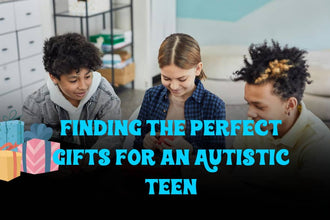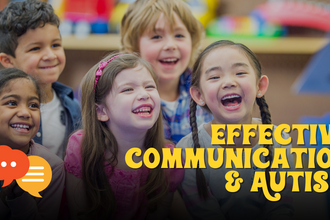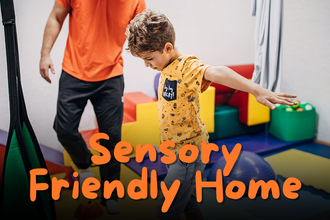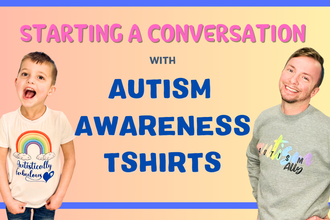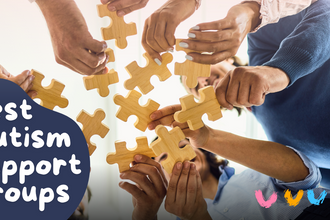
Dating can be exciting but also challenging, especially when one partner has autism. Autism brings unique strengths and challenges to relationships, requiring understanding and support from both sides. In this blog, we'll look into practical tips and real stories to help both neurotypical and autistic partners understand dating someone with autism.
I. Tips for individuals with autistic partners
A. Dos
- Cultivate Empathy and Patience
- Take the time to understand your partner's perspective and experiences.
- Be patient and supportive, especially during moments of difficulty or stress.
- Wear autism awareness t-shirts to openly advocate for acceptance and understanding.
- Use Clear and Direct Communication Strategies
- Communicate openly and directly, avoiding ambiguity or indirectness.
- Be mindful of your partner's communication style and adjust accordingly for better understanding.
- Respect Boundaries and Sensory Sensitivities
- Honor your partner's boundaries and preferences, both physical and emotional.
- Be mindful of sensory sensitivities and create environments that are comfortable and accommodating.

B. Don'ts
- Assume Norms
- Avoid assuming that your partner should conform to societal norms or expectations.
- Challenge stereotypes and misconceptions about autism, and embrace your partner's unique traits.
- Ignore Emotional Needs
- Don't overlook the importance of emotional connection and intimacy in the relationship.
- Make efforts to understand and validate your partner's feelings, even if they express them differently.
- Overlook Individuality
- Avoid trying to change your partner or force them to fit into a mold.
- Celebrate your partner's individuality and growth, embracing their strengths and supporting their personal development.

II. Tips for autistic individuals in a Relationship
A. Dos
- Advocate for Communication Preferences
- Clearly communicate your preferred communication style and needs to your partner.
- Encourage open dialogue about how to effectively communicate with each other.
- Establish Clear Boundaries and Expectations
- Define and communicate your boundaries and expectations within the relationship.
- Be assertive in expressing your needs and boundaries to ensure mutual understanding.
- Embrace Emotional Vulnerability and Expression
- Allow yourself to be emotionally vulnerable with your partner, expressing your feelings openly.
- Practice self-awareness and identify healthy ways to express and manage your emotions.

B. Don'ts
- Mask Identity
- Avoid masking or hiding your true self to fit societal expectations or please your partner.
- Be honest and authentic in your interactions, allowing your partner to know the real you.
- Avoid Conflict Resolution
- Don't avoid or suppress conflicts within the relationship.
- Instead, work together with your partner to address challenges constructively and find solutions.
- Neglect Self-Care and Personal Growth
- Don't neglect your own well-being and personal development for the sake of the relationship.
- Prioritize self-care activities and invest in your own growth and fulfillment.

Spectrum Stories: Love, Challenges, Connection
- From an Autistic person
In a heartfelt confession on redditt, a member shared, 'I am on the spectrum. I require understanding when I need my space due to overstimulation or high emotions to avoid meltdowns. Sometimes I need to be alone, and sometimes I need to be held.' They emphasized the need for patience during conflicts, stating, 'If we fight, I need time to gather my thoughts.'
They also highlighted struggles with unexpected changes, adding, 'Some days I can handle it, and others I may be unable to handle anything else.' Clear communication was stressed: 'If I ask a million questions, it’s because I am genuinely trying to understand.'
Despite challenges, they pledged loyalty and love, saying, 'I will always have your back and show my love through art, music, and cheesy comments/jokes.' This touching narrative underscores the importance of empathy and clear communication in relationships with individuals on the autism spectrum.

- From a Neurotypical Person
In another heartfelt story on reddit, a member shared their dating experience with someone on the autism spectrum. They expressed, 'I’m pretty straightforward about how I feel and anytime he couldn’t read me, he would just ask and I would tell him.' Despite their usual anxiety in relationships, they felt 'secure and safe' with their partner on the spectrum. They appreciated their partner's dependability and positivity, describing them as 'wonderful' and loving their personality.
The member reflected on their journey of understanding, acknowledging that their partner processed emotions differently: 'I guess I just had to learn that although he couldn’t read my feelings off my face or body language, as soon as I told him how I was feeling, he was so empathic and understanding he just processed my emotions in a different way.' This realization facilitated a deep connection between them.
Their story serves as a testament to the transformative power of empathy, communication, and acceptance in relationships with individuals on the autism spectrum.
Key Takeaway
In simple terms, dating someone with autism can be both exciting and challenging. It's important for both partners to understand each other's perspectives and communicate openly. By respecting boundaries, embracing differences, and supporting each other, couples can build strong and loving relationships.
Become a part of Prideful on the Spectrum's community today where we spread awareness about the diverse spectrum of abilities in autistic individuals. Explore our carefully crafted toys and a clothing line that aims to celebrate differences and challenge stereotypes. Come and join hands in bringing a change- Explore now!


